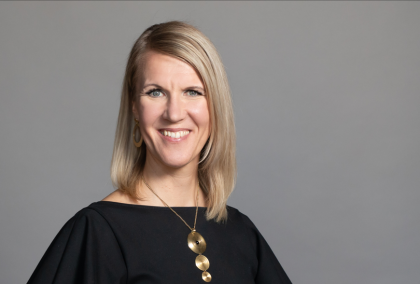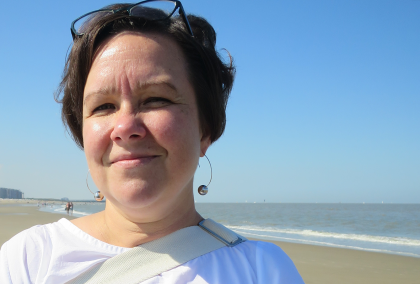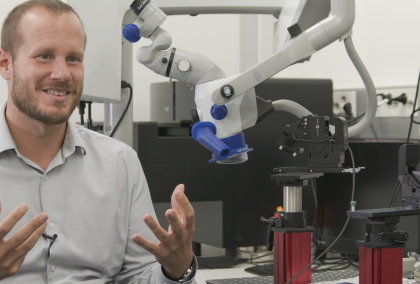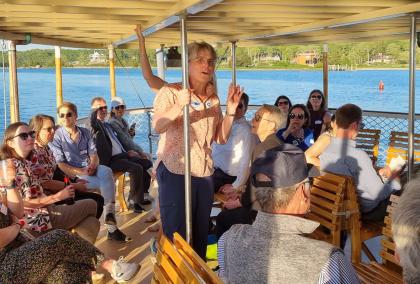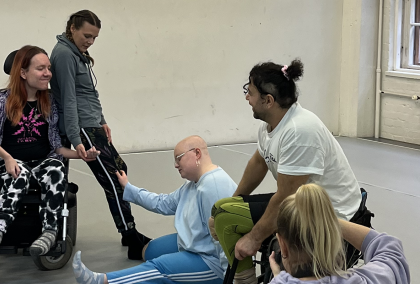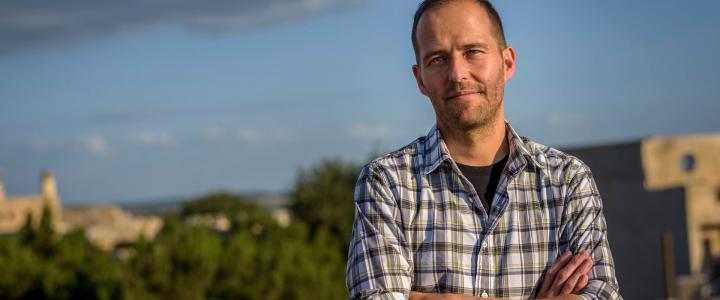

Mikko Alanne has always been fascinated by true life stories. “I’ve always been drawn to stories of survival, and I’m fascinated by lone crusaders for justice, stories about who people become under extreme circumstances. We expect ourselves to be heroic, but we never know what we are capable of until we are put into that kind of situation.”
Born in Espoo, Finland, in 1972, Mikko went to the U.S. with a Fulbright Finland Foundation
undergraduate grant in 1993, and has since built a remarkable career in screenwriting for feature films, documentaries and television, focusing on stories of courage and adversity often based on real-life events.
Named one of Variety magazine’s top global creatives to watch in 2018, Mikko has transformed from screenwriter to showrunner in his latest project, the National Geographic television series about the Iraq War, The Long Road Home, which began airing in late 2017. Adapted from Martha Raddatz’s book of the same name, the show explores the trauma of war on both sides of the conflict, portraying the real life experiences of a newly-arrived platoon of U.S. soldiers and their Iraqi translator who were ambushed in Sadr City in April 2004, as well as that of their families and ordinary Iraqi people.
“My journey to making the show began with Martha Raddatz’s book, which I literally read in one sitting,” Mikko recalls. “It was one of the most astonishing pieces of reporting I’d ever read. What made it so different is that Martha captures the terror and chaos of war, but also the love of families and spouses, and the bonds of friendship between the soldiers. It’s a portrait of the ordinary soldier, of what it’s really like to go to war for the first time, for both the soldiers and their families. The other thing that intrigued me about the book, something that’s become even more apparent looking back, is that it captures a tremendous crossroads in history; the beginning of the insurgency in Iraq, the collapse into civil war, the birth of ISIS. I really feel Martha rescued all these families from being lost to history.”
Truthful Storytelling
Mikko is fascinated by true stories of trauma, heroism and hope, and says that’s why he mainly works on adaptations of real life stories. This has profound implications when producing a TV show or feature film, he notes. “I take very seriously the fact that when it says ‘based on a true story’, people do assume that the essence of the story is true. For The Long Road Home, I worked very closely with the principal families, eight of whom became main characters. I got to know them very well over the years I spent working on the script. I had to make sure they were comfortable with a certain amount of dramatic licence. Life doesn’t unfold in a three-act dramatic structure, so as a writer you have to make adjustments.”
“It is a very tragic story. We have people who lost their sons and husbands watching the show. How do we portray these events so that the family can be OK with that, but so that the audience can see what war is really like? These are challenges most projects don’t have. People directly affected by the events are not usually the ones watching it at home.”
“I was really inspired by the remarkable connection and caring Martha Raddatz had with the families from her reporting. That became an inspiration for me and the whole production. It’s funny. I’m very much a vocal Hollywood liberal, and many of the veterans and their families are conservative Republicans, but we have this incredible bond and love for each other. Many people on the veterans’ side said this experience changed their view of what they thought ‘Hollywood types’ were like, and the same was true on the production side with respect to conservatives. Working together like this helps challenge our preconceptions of people’s politics or differences. It was a truly life-changing experience for everyone in the production, particularly the actors, even the editors!”
From Screenwriter to Showrunner
This project is Mikko’s first experience as a showrunner, the lead executive producer who is the creative decision-maker for the entire project. “As a screenwriter, I had never produced a TV show before. When they offered me the role I said yes, of course! Then began the intense process of getting everything ready. I was lucky to have an incredible team around me.”
“It’s been an incredible transition from working in feature films, where you turn in the script, perhaps visit the set and then see the film at the premiere, to where you have a say over every single decision, and you have to approve everything from costumes to signage. It can be a quite stressful job, but I was giddy with excitement. Every day I went to work with a big smile on my face.”
A Passion for Stories and Social Impact
Mikko’s love of film began as a child, and only strengthened in high school while participating in a summer abroad program for six weeks in San Francisco. “It had always been my dream to come to the States. I realised I’d love to go to film school, but it was not financially possible.” On hearing about the Fulbright Finland Foundation’s undergraduate program, he applied for a scholarship to study film at Ithaca College in New York.
Mikko was enrolled in the Finnish army on military service when he discovered his application had been successful. “I almost missed out! It was October 1992, and I’d been away for weeks on a military exercise in Lapland. My parents got a call from Fulbright Finland saying we sent Mikko an acceptance letter weeks ago, does he really not want to take the place? They went through the mail that had been piling up on my desk, and there it was.”
“Studying at Ithaca really became one of those watershed moments that shaped what kind of work I wanted to do.”
At Ithaca, in addition to studying film, Mikko became fascinated by sociology.
“It was like discovering the subversive aspect of history. In sociology class we talked a lot about interpersonal violence, crime, punishment and justice, and it became what I wanted to make my work about. I remember saying to my advisor, Dr. Elaine Leeder, that I was thinking of switching my major from film to sociology, but she talked me out of it. She told me the world has enough sociologists, you should focus on telling people about these issues in film. I’m still in regular contact with her, and I still have some of the textbooks from that class. She’s one of the most important mentors in my career, and I’d never have met her if I hadn’t gotten the Fulbright Finland Foundation grant.”
Mikko discovered his talent and passion for screenwriting shortly after finishing college, working for the director Oliver Stone. “I was a great admirer of his work, all his films that sparked enormous debate. During my last semester I got an internship with Oliver’s company, and was then hired as a researcher.”
Mikko worked for a year as a researcher, and then as a story editor, liaising between writers and research teams. “We were working on a film about the atomic bombings of Hiroshima and Nagasaki, and I remember saying to Oliver that the writers just didn’t use the most interesting parts of the research. He said, ‘You should just take over and write it instead.’ That’s how he gave me my first screenwriting assignment.”
The ambition that drives all of my work, is to make a positive social impact, bringing the stories that matter to a wide audience.
Mikko’s passion for bringing true stories to light led him to a role at Steven Spielberg’s Survivors of the Shoah Visual History Foundation (now The USC Shoah Foundation Institute for Visual History and Education), which documents the Holocaust and other genocides through audio-visual interviews with survivors and witnesses. “I spent five years working as Historical Content Supervisor. It was an incredibly fascinating and inspiring place to work.”
In 2004 Mikko left the Foundation to become a full-time screenwriter after selling a project to HBO. He has since worked on numerous documentaries and feature films, including Warner Bros’s Chilean miner rescue drama The 33, starring Antonio Banderas and Juliette Binoche. The ambition that drives all of his work, Mikko says, is to make a positive social impact, bringing the stories that matter to a wide audience.
Fearless Optimism and New Ideas
For Mikko, tenacity and optimism are essential attributes in screenwriting. “I always believe every project is going to be successful, otherwise you don’t give your best work. I’ve sold 14 pilots for different networks, and The Long Road Home is the first one that got made.
To succeed in this industry you have to be fearless and bold.
Understandably people who don’t work in the movie business don’t realise that just because someone has commissioned a script it may never make it to the screen. My parents at one point said it must be devastating when you work for months and months and it doesn’t get made, but I say it just hasn’t been made yet!”
“To succeed in this industry you have to be fearless and bold. Nowadays in the creative field, there is a real opportunity to have your work be seen, even in YouTube you can get your work in front of people and it can go viral in a way that wasn’t possible before.”
“The reason I’m here doing this work that I do now, is because I went to Ithaca College, a school I had never even heard of until I applied for the Fulbright Finland Foundation undergraduate grant. I’m so grateful that I was able to go to film school in a liberal arts college, where I could also study sociology. It has had a tremendous impact on the work that I do. I came to Ithaca with very clear goals, but left with new ideas. You discover new things all the time, and you don’t know where the path is going to lead you.”
Mikko Alanne
1993-94 Fulbright Finland Undergraduate Grant to Ithaca College in New York to study film.
Read the whole Fulbright Finland News magazine 1/2018!
